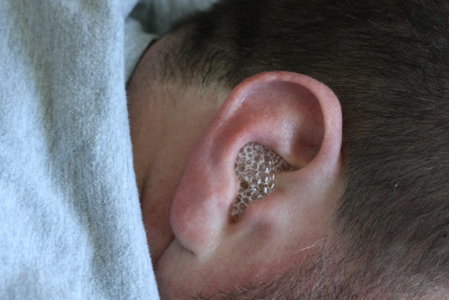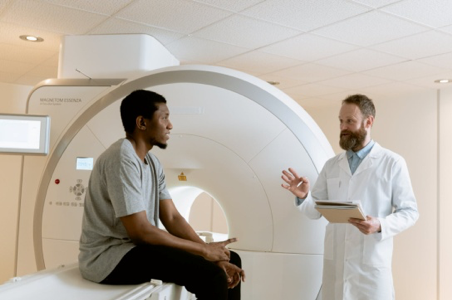Ear infections and diseases are unbearable in many cases because the patients experience intense pain and discomfort. The best solution is to go to ENT doctors who specialize in treating these conditions and diseases of ear, nose, throat, and more. Their primary areas of focus are the head and neck, and they often perform surgeries.

(Source)
An ENT doctor will diagnose ear infections and diseases that you or any other patient might have. Notably, identifying the symptoms play a vital role in the detection and diagnosis of ear infections. Learning more about them can help you get the best treatment plans from your ENT doctors. Your general doctor may refer you to the best otolaryngologist/ENT doctor for your health conditions.
Common Ear Treatments from an ENT
Several different organizations and statistics suggest that ear infections are common health concerns in the US. Ear treatments that an ENT doctor might offer for different ear conditions include ringing in the ear (tinnitus), cranial nerve disorder, balance disorder, nerve pain, infections, congenital disorders, and inner and outer ear defects.
ENT doctors utilize the medications as well as surgical methods to help their patients get relief from chronic ear disease symptoms and prevent any potential problems.
Ear Infections
Ear infections can develop in any part of the ear, but they are more common in the inner ear (i.e., around the eardrum). The buildup of excessive fluids behind the eardrum and around the middle part of the inner ear can lead to infections and bacteria growth.
Thus, there is further damage to your ear if left untreated. Bear in mind that the germs that cause the fluid buildup and infection can enter your middle ear via the nose or throat. Commonly, this occurs due to sickness that persists for more than usual.
Furthermore, the Eustachian tube links your ear to the throat, and you may experience swelling in the tube if an infection develops, making it easy for fluid to accumulate inside the ear. The general risk factors for ear infections include:
- Respiratory infections
- Allergies
- Eustachian Tubes Dysfunction
- Congenital Health Defects
It is significant to have the right knowledge about the ear pain that occurs due to an infection and one that occurs due to allergies. Consequently, your ENT doctor will be able to prescribe the right medications and treatment plans after diagnosis to help you recover.
What Services Does an ENT Offer for Ear Infections and Disorders?
Ear Tubes for Ear Infections
Draining the excess fluid that is present in the middle ear due to an ear infection is a common procedure that ENT doctors perform. Normally, it becomes suitable if the patient has a recurring fluid buildup and the ear infection causes unbearable head pain.
The procedure of inserting ear tubes involves making a precise incision to let the fluids excrete from the eardrum (i.e., incision on the eardrum). Generally, a temporary tube covers the opening, which enables ventilation and the prevention of unintentional fluid buildup. The ENT doctor will perform the suction on the fluid and might also leave the tube inside the ear for a period that is medically suitable for the patient.

(Source)
In some cases, your ENT doctor might insert the ear tube for a year. Eventually, they might surgically remove the ear tube, or it may fall out on its own. Following this, your eardrum might heal on its own.
Suppurative Otitis Media
Chronic Suppurative Otitis Media is a condition in which ear infections cause a tear on the eardrum (often a hole). While it is troublesome to treat such a hole or tear on the eardrum, your ENT doctor might prescribe antibiotic drops or may recommend fluid suctions techniques.
Antibiotic Treatments
After diagnosis, the first step that an ENT specialist takes is the prescription of antibiotics. What you should know is that antibiotic therapy involves taking the prescribed medicine on time.
ENT doctors recommend not taking prescription medicines when you are on antibiotic treatments. They suggest that by disturbing the antibiotic therapy, you might increase the chances of bacterial infection.
Pain Management for Ear Infections and Conditions
Pain medications are a must for ENT patients who are suffering from chronic ear infection pain. Commonly, ENT doctors might prescribe them any one of the following two:
- Anesthetic drops
- Over-the-counter pain medicines.
Visit an ENT
For your initial visit to an ENT doctor to find treatment for your ear infections or other similar conditions, make sure that you take records of your previous medical history. The ENT doctor will conduct appropriate visual and physical examinations to assess the severity of your ear infection.
Next, they will devise a treatment plan according to your problem. Nevertheless, seeking prompt medical care from an ENT specialist is critical if your ear infection does not resolve.
ENT Services for the Ear: Conclusion
Michael C. Burnett MD at Ear, Nose & Throat of New York, has the knowledge and expertise to treat all Ear & ENT related problems.
Call us at 212-867-4813 to book an appointment with Dr. Burnett today. Get the best medical treatment for your ear infection from the best ENT doctor in New York. Check out our official website for more info.
Reference Links:
https://www.mayoclinic.org/diseases-conditions/ear-infections/diagnosis-treatment/drc-20351622
https://www.webmd.com/cold-and-flu/ear-infection/understanding-otitis-media-treatment
https://medlineplus.gov/earnoseandthroat.html
https://healthengine.com.au/info/otorhinolaryngology
https://www.healthline.com/health/ear-infections
https://www.healthline.com/health/otitis








[…] job of an otolaryngologist is to attend to patients who experience health issues and problems concerning the ear, nose, and throat area. They are experts in using specialized equipment to diagnose, examine, and […]